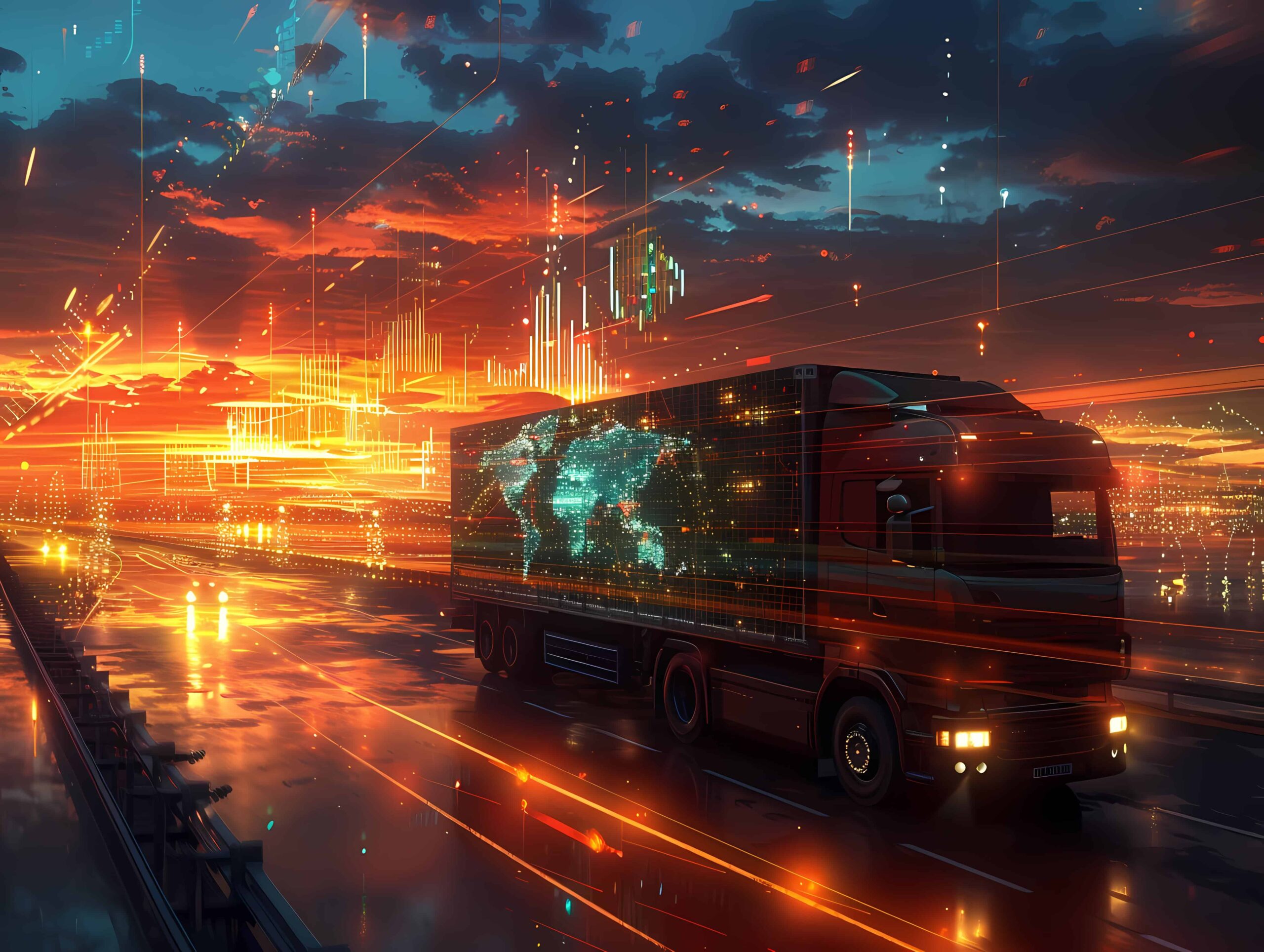Resources > How AI is Affecting Trucking
How AI is Transforming the Trucking and Transportation Industry

AI Rendition of a Semi-Truck Utilizing AI technology | Credit: Freepik
The rise of artificial intelligence is reshaping industries worldwide, and the trucking and transportation sector is no exception. AI-powered technologies are driving efficiency, improving safety, and optimizing costs, making them essential tools for modern fleet management. From autonomous trucks to predictive maintenance, AI is changing the way transportation companies operate. But with these advancements come challenges, including regulatory hurdles, cybersecurity concerns, and workforce shifts.
This blog explores how AI is revolutionizing trucking and transportation, highlighting the benefits, challenges, and the future of AI-driven logistics.
1. Autonomous Trucks & Driver Assistance
AI-driven self-driving technology is one of the most talked-about innovations in trucking. Companies like Tesla, Waymo, and Aurora are developing autonomous trucks, aiming to reduce human error and enhance efficiency. While fully autonomous trucking is still years away, AI-powered driver assistance systems are already making a significant impact.
- Advanced Driver-Assistance Systems (ADAS): AI enhances safety with features like lane-keeping assistance, automatic braking, and adaptive cruise control, reducing accident risks.
- Autonomous Trucking Trials: Some companies are already testing self-driving trucks on highways, with human operators on board to intervene if needed.
- Future Potential: AI could lead to fully autonomous long-haul routes, reducing labor costs and increasing operational efficiency.
2. Route Optimization & Fuel Efficiency
AI-powered route planning is transforming the logistics of trucking, ensuring drivers take the most efficient paths based on real-time data.
- Dynamic Route Adjustments: AI analyzes traffic, weather, and road conditions to provide optimal routes, reducing delays and fuel consumption.
- Fuel Cost Reduction: AI-based fuel optimization ensures trucks operate at peak efficiency, cutting costs for carriers.
- Improved Delivery Times: AI minimizes disruptions, allowing for more precise delivery estimates and better customer service.
3. Predictive Maintenance: Preventing Costly Breakdowns
One of the biggest challenges for trucking companies is vehicle downtime due to unexpected breakdowns. AI-driven predictive maintenance can help prevent these costly disruptions.
- Sensor-Based Monitoring: AI analyzes data from vehicle sensors to detect potential issues before they become major problems.
- Proactive Repairs: Predictive maintenance scheduling ensures trucks are serviced at the right time, reducing the risk of breakdowns.
- Cost Savings: Minimizing downtime translates to lower repair costs and increased productivity.
4. Enhanced Fleet Management with AI
AI is revolutionizing fleet management by providing real-time insights into vehicle performance, driver behavior, and logistics operations.
- Real-Time Tracking: AI-powered fleet management systems allow trucking companies to monitor vehicles in real-time, ensuring efficiency.
- Load Optimization: AI helps distribute loads evenly across trucks, maximizing capacity and reducing fuel waste.
- Compliance Automation: AI-driven systems assist with regulatory compliance, such as Hours of Service (HOS) tracking and Electronic Logging Device (ELD) management.
5. AI-Powered Safety & Compliance
Safety is a top priority in the trucking industry, and AI is playing a crucial role in reducing accidents and ensuring compliance.
- Driver Monitoring: AI-powered dash cams detect signs of fatigue, distraction, or risky driving behavior, providing alerts to prevent accidents.
- Automated Logbooks: AI simplifies compliance by automatically recording driver hours and generating reports for regulatory agencies.
- Accident Prevention: AI-based safety analytics help companies identify risk factors and implement preventive measures.
6. AI in Logistics & Supply Chain Management
AI is streamlining logistics and supply chain operations, making freight movement more efficient and cost-effective.
- Freight Matching: AI helps connect carriers with available loads, optimizing truck utilization and reducing empty miles.
- Demand Forecasting: AI analyzes historical data to predict demand fluctuations, allowing companies to plan more effectively.
- Warehouse Optimization: AI improves inventory management and streamlines warehouse operations, reducing delays.
7. Workforce & Job Market Changes
While AI is enhancing efficiency, it is also reshaping the trucking job market. However, rather than eliminating jobs, AI is changing their nature.
- AI as a Co-Pilot: AI assists drivers rather than replacing them, making trucking jobs safer and less stressful.
- Reduced Administrative Burden: AI automates paperwork and compliance tasks, allowing drivers and fleet managers to focus on high-value work.
- Upskilling Opportunities: As AI technology grows, new roles in AI oversight, fleet analytics, and digital logistics are emerging.
8. AI & Cybersecurity in Trucking
With increased digitalization, cybersecurity is a growing concern in trucking. AI is being used to enhance security and protect sensitive data.
- Threat Detection: AI-powered cybersecurity tools identify and mitigate cyber threats in real-time.
- Data Protection: AI ensures the security of digital logs, fleet management systems, and customer data.
- Preventing Cyberattacks: AI-based monitoring systems detect vulnerabilities before they can be exploited.
Challenges & Considerations
Despite the benefits, AI adoption in trucking comes with challenges:
- Regulatory Compliance: AI-driven trucks and fleet systems must comply with evolving transportation regulations.
- Implementation Costs: Investing in AI technology requires significant capital, which can be a barrier for smaller carriers.
- Ethical Concerns: The impact of automation on truck driving jobs remains a key issue.
The Future of AI in Trucking
AI is revolutionizing trucking and transportation, making operations safer, more efficient, and cost-effective. While challenges exist, the future is moving toward AI-assisted logistics rather than full automation. Trucking companies that embrace AI-driven solutions will stay competitive in an increasingly digital industry.
As AI continues to evolve, its role in trucking will expand, offering new opportunities for efficiency and innovation. Whether through route optimization, predictive maintenance, or driver assistance, AI is shaping the future of transportation, one mile at a time.
